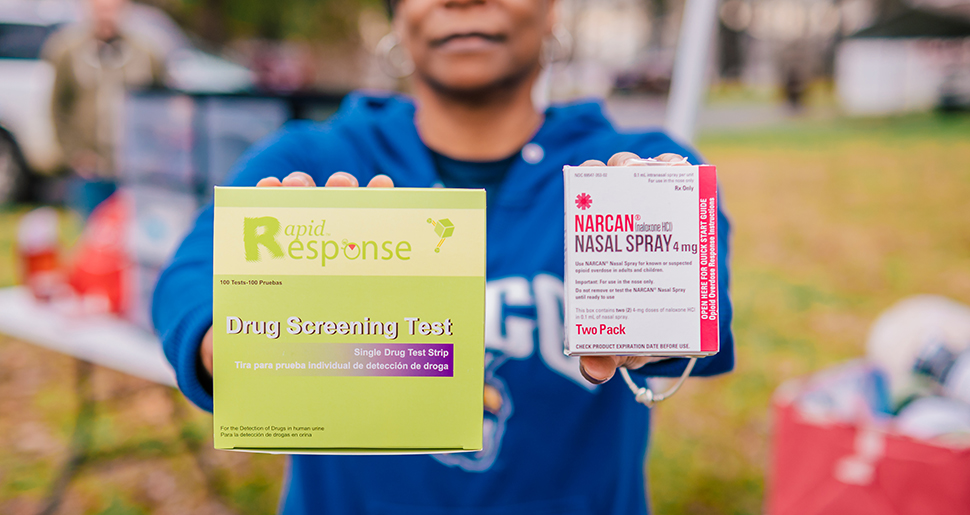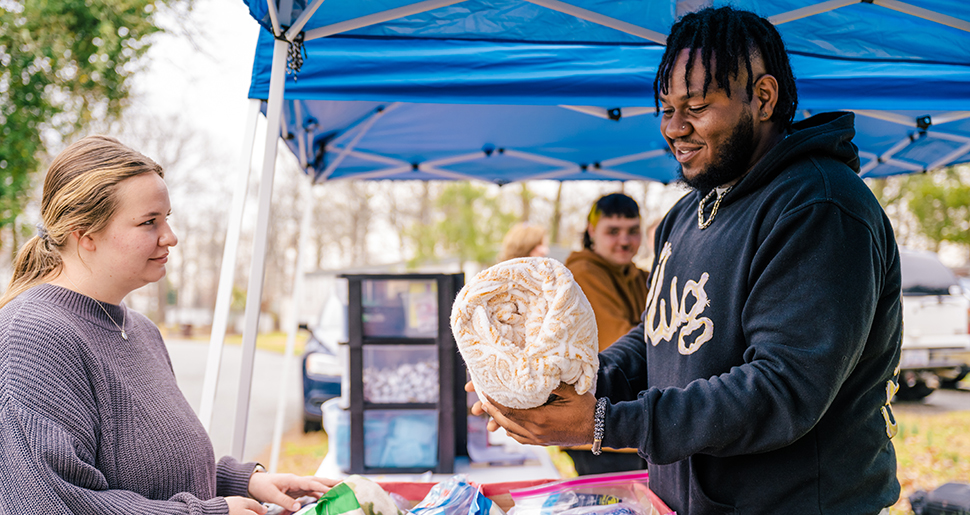A woman pulled up in a Guilford County Walgreen’s parking lot, got out of her car and walked over to a group of students.
“Hey, how’s your car doing?” asked Marella Farrington, one of the students and an intern with GCSTOP.
The two women talked for a moment, before the woman got the harm reduction supplies she came for from Farrington, returned to her car, and left.
This exchange of pleasantries between the women may not seem like much, but it’s important to the participants of GCSTOP, the Guilford County Solution to the Opioid Problem.
GCSTOP is a partnership program between UNC Greensboro and Guilford County that began in 2018, and is focused on harm reduction. This includes supplying participants with naloxone to reverse an opioid overdose, providing clean syringes, the distribution of safe supplies for injections, handing out condoms, and distributing food and clothing.
“It is not enabling people. We’re in the right place at the right time,” said Farrington.
We extend someone’s life.

GCSTOP is primarily funded by the county, but is operated mainly by UNCG, and has student interns from UNCG and other schools who hand out supplies at locations in High Point and Greensboro. There’s also a phone number people can call if they need something.
“The team is talented at listening to what people need and want,” said Mike Thull, GCSTOP clinical program director.
Giving people food and clothing helps with engagement of both people in the community and new participants.
“Success for GCSTOP is ensuring that people of Guilford County don’t die,” Thull said.
“We have more opportunities to prevent disease and give naloxone. It’s an opportunity for people to see their family again or get treatment if they choose.””
That happened at one of GCSTOP’s outreach events in High Point. A participant came for supplies, and talked to Farrington. The participant mentioned he thought he’d missed his appointment at a treatment clinic. Farrington followed up with him, verifying it was later in the week and he could still go.
And for people who may not be ready to make a change, the GCSTOP interns support them without judgment. Graduate student Oliver Sugiyama stressed the value of the syringe exchange program, in which participants can get clean needles. GCSTOP interns are always listening for someone who is interested in making a change in their life, but that may not be for everyone.
“For the people who are never going to recovery, they also deserve our love and support,” Sugiyama said.
There’s a lot of risks with injection. We give medical supplies, ask if they’re going to do tester shots, tell them don’t use alone, have a hotline number with them, make sure they have Narcan.

Some of the interns at GCSTOP wanted to join the program for personal reasons – two lost family members to overdoses. Others saw it as a great opportunity to learn about a different type of social work than what they were considering.
Nigel “Shabazz” Moffitt-Shabazz was planning to work with children upon graduation.
After interning with GCSTOP, he said he could see shifting his focus to youth who may need assistance with drugs or other intervention. Shabazz, who was recently accepted into the UNCG-N.C. A&T University joint Master of Social Work program, said the internship with GCSTOP opened his eyes.
“It seems like everyone turns away from this population. Just look at them as a person, they’re trying to make it another day,” he said.
Don’t judge them for their situation. Don’t have any prejudices.
Reggie McCain, who was also accepted into the joint Master of Social Work program, said GCSTOP also changed his career plans. McCain wanted to be a counselor. Now he wants to be a center director, where he can impact policies.
“Getting out into the community and seeing people are in their situations because of the policies that are in place (impacted me),” he said. “There are limitations on housing, jobs, food, services. These policies need to be changed.”
McCain wasn’t interested in social work for years. He worked in a restaurant for most of his career before deciding as an adult to get his bachelor’s degree in social work at UNCG.
“People seemed to respond to me talking to them,” he said.
You can change people’s life just by listening to them, when no one else listens.
Story by Sarah Newell, HHS Communications.